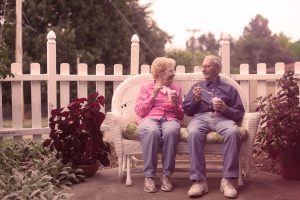 Sponsored content: The decision to begin assisted living care is never an easy one, and at times it can be difficult to determine if it’s time to make that transition. However, there are ways to tell if it might be time for your loved one to begin assisted living care.
Sponsored content: The decision to begin assisted living care is never an easy one, and at times it can be difficult to determine if it’s time to make that transition. However, there are ways to tell if it might be time for your loved one to begin assisted living care.
A slow recovery
How did the person you’re caring for weather the most recent illness (for example, a bad cold or flu)? Was he or she able and willing to seek medical care when needed, or did last winter’s cold develop into untreated bronchitis?
Increasing difficulty managing the activities of daily living (ADLs) and instrumental activities of daily living (IADLs)
ADLs and IADLs are the skills needed to live independently – dressing, shopping, cooking, doing laundry, managing medications and so on.
Noticeable weight loss
Does the person feel thinner? Are clothes loose, or has he or she added notches to his or her belt? Many conditions, from depression to cancer, can cause weight loss. A person who is having trouble getting out to shop or remembering how to cook (or to eat) can lose weight; check the fridge and watch meal prep skills.
Seeming more frail
Do you feel anything “different” about the person’s strength and stature when you hug? Can your loved one rise easily from a chair? Does she or he seem unsteady or unable to balance? Compare these observations to the last time you were together.
Strange body odor
Unfortunately, a close hug can also reveal changes in personal hygiene habits. Causes range from memory trouble to depression to other physical ailments.
Changes in appearance
Does the person’s hair and makeup look all right? Are clothes clean? Someone known for crisply ironed shirts who’s now in a stained sweatshirt may lack the dexterity for buttons or may have lost the strength for managing an ironing board and iron. A formerly clean-shaven man with an unkempt beard mahy be forgetting to shave (or forgetting how to shave).
Snowdrifts of mail in various places
Finding lots of mail scattered around raises concerns about how bills, insurance and other matters are being managed. Piles of mail are also a potential tripping hazard.
Unopened personal mail
Everybody skips junk mail, but few of us can ignore a good old-fashioned, hand-addressed letter.
Unopened bills
This can indicated that your loved one is having difficulty managing finances – one of the most common first signs of dementia.
Letters from banks, creditors or insurers
Routine business letters aren’t worrisome. However, it’s alarming if they’re referring to overdue payments, overdrawn balances, recent accidents or other concerning events.
Thank you messages from charities
Older adults often are vulnerable to scammers. Even those who have always been fiscally prudent are vulnerable if they’re having trouble with thinking skills (a common sign of Alzheimer’s disease). Some charities hit up givers over and over, and your loved one may not remember having donated the first time.
Lots of crisp, unread magazines
The person may unknowingly have repeat renewal subscriptions he or she doesn’t need.
Stale or expired foods
We all buy more than we need. Look for signs that food is not only old, but that this is unnoticed – mold, sour milk that’s still used or expiration dates well past due, for example.
Multiples of the same item
Ten bottles of ketchup? More cereal than can be eaten in a year? Multiples often reveal that the shopper can’t remember from one store trip to the next what’s in stock at home.
A freezer full of TV dinners
Your loved one may buy them for convenience sake, but frozen dinners tend not to make a healthy diet. If there’s not much fresh food in the house (because it’s too hard for the person to procure or cook), your loved one might be ready to have help with meal prep or delivery services.
Lots of clutter
An inability to throw away may be a sign of a neurological or physical issue. Obviously, it’s more worrisome in a neatnik than having lots of clutter. Papers or pet toys all over the floor represent a tripping hazard.
Signs of lax housekeeping
Spills that haven’t been cleaned up are a common sign of dementia – the person lacks the follow-through to tidy. Keep an eye out for cobwebs, bathroom mold, thick dust or other signs of slackness. Physical limitations can mean your loved one needs housekeeping help or a living situation where this is taken care of for him or her.
The Stilley House Assisted Living and Memory Care Community can help alleviate the concerns families face when determining if assisted living care is the right course of action. The Stilley House takes the word “family” seriously, and treats your loved ones with respect, dignity and care that is so deserved.
The Stilley House offers many amenities to accommodate residents’ needs, including private and companion apartments, barber and beauty salon, 24-hour staffing, medication assistance, transportation and cleaning services, among many others. Safety is a priority at the Stilley House, and staff have emergency procedures and provisions in place.
To learn more about assisted living care and The Stilley House community, visit stilleyhouse.com or call 270-527-1700.
Content sponsored by The Stilley House Assisted Living and Memory Care Community.
